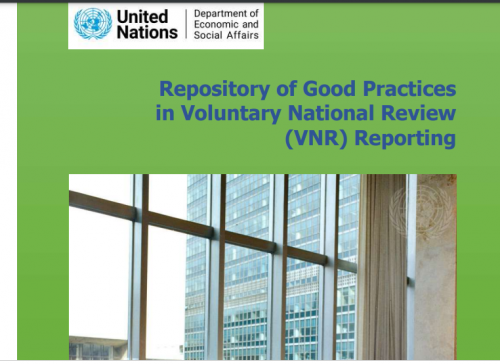
http://sdg.iisd.org/news/review-of-247-vnrs-points-to-good-practices-in-...
Publication here: https://sustainabledevelopment.un.org/content/documents/29453Repository_...
A The report is based on a review of 247 VNRs submitted to the UN High-level Political Forum on Sustainable Development (HLPF) between 2016 and 2021. The report observes that “no country is too small or underdeveloped to have noteworthy experiences to share, and no country is too big or developed to have nothing to learn from others.”
A publication from the UN Department of Economic and Social Affairs (DESA) identifies specific good practices in Voluntary National Review (VNR) reporting, to help countries by “learning from practice.” The report is based on a review of 247 VNRs submitted to the UN High-level Political Forum on Sustainable Development (HLPF) between 2016 and 2021. The report observes that “no country is too small or underdeveloped to have noteworthy experiences to share, and no country is too big or developed to have nothing to learn from others.”
The report titled, ‘Repository of Good Practices in Voluntary National Review (VNR) Reporting,’ is authored by Javier Surasky, Centro de Pensamiento Estratégico Internacional (CEPEI).
In defining “good practices,” the report prioritizes practices that:
- Align with the 2030 Agenda’s principles for implementing the SDGs;
- Align with the 2030 Agenda’s principles for reviewing and reporting exercises;
- Can be replicated and scaled up; and
- Integrate economic, social, and environmental aspects of sustainable development.
It also considers the results reported from each practice.
The author emphasizes that a good practice must be “understood in the context in which it takes place” and should not be replicated without analysis of the likely differences in outcome due to context. The good practices compiled in the report thus represent a “gateway” to identify options for adapting to other local contexts.
Good practices in preparing VNR reports relate to:
- Reporting on the 2030 Agenda as a whole;
- Alignment with the UN Secretary-General’s Voluntary Guidelines for VNRs;
- Integrating three dimensions of sustainable development;
- Leaving no one behind;
- Localization of strategies; and
- Communicating VNRs to the public.
Good practices are also identified on: stakeholder engagement; building data-based VNRs; identification of gaps and challenges; and UN system support for VNRs.
Each suggested good practice is described alongside examples from countries that have used the practice in their VNRs.
For example, on integrating the three dimensions of sustainable development, Paraguay’s 2021 VNR highlighted a national project – PROEZA – that combines poverty reduction, reforestation, renewable energy, and climate action, to help advance both its national development plan and the Paris Agreement. The project is funded by the Green Climate Fund and technically supported by the World Bank.
On leaving no one behind, Cabo Verde’s 2021 VNR identifies nine groups most at risk of being left behind: extremely poor; not in education, employment, or training; youth; elderly; people with disability; immigrants; prisoners; children and adolescents at risk; and sexual minorities. The report notes each group’s immediate, underlying, and structural causes of vulnerability, and presents government commitments to address the vulnerabilities.
The author suggests that each VNR identify the country’s own at-risk groups. Data availability “blind spots” can mean that some at-risk groups are overlooked, so such data gaps also should be mentioned.
On localizing SDG strategies, the report notes that local actors can help uncover specific experiences in implementing the SDGs in communities. Investing in territorial data disaggregation is another key to localizing the 2030 Agenda.
The report observes that the VNRs – a key element of the follow-up and review architecture for the 2030 Agenda and its SDGs – have become “one of the more innovative contributions of the current global development agenda.” And even though preparing and presenting a report are voluntary exercises, 90% of UN Member States have already submitted at least one VNR report.










Add new comment